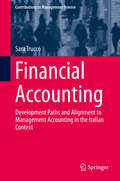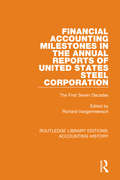- Table View
- List View
Financial Accounting
by Wayne Thomas Don Herrmann David SpicelandDon’t you love those moments in your course when students are fully engaged? When the “Aha!” revelations are bursting like fireworks? The authors have developed a unique set of materials based directly on their collective years in the classroom. They’ve brought together best practices by (1) building an Organized Learning Framework for Financial Accounting, (2) reinforcing the Framework in each chapter’s text and end-of-chapter assignments, and (3) enriching that Framework using real-world companies, Excel assignments, General Ledger problems, data analytics tools, and a variety of auto-graded cases. The material is communicated in a student-friendly, concise and conversational writing style. After the proven success of the first five editions of Financial Accounting, we are confident that the sixth edition will not only motivate, engage, and challenge students—it will illuminate the financial accounting course like never before.
Financial Accounting
by Robert Libby Patricia Libby Frank HodgeLibby/Libby/Hodge wrote this text based on their belief that the subject of financial accounting is inherently interesting, but financial accounting textbooks are often not. They believe that accounting is an exciting field of study and one that is important to future careers in business. When writing this text, they considered career relevance as their guide when selecting material, and the need to engage the student as their guide to style, pedagogy, and design. Financial Accounting 11e successfully implements a real-world, single focus company approach in every chapter. The companies chosen are engaging and the decision-making focus shows the relevance of financial accounting regardless of if a student has chosen to major in accounting. Libby/Libby/Hodge believes in the building-block approach to teaching transaction analysis. Most faculty agree that mastery of the accounting cycle is critical to success in financial accounting, and yet most financial texts introduce and develop transaction analysis in one chapter, bombarding a student early in the course with an overload of new concepts and terms. The authors slow down the introduction of transactions, giving students time to practice and gain mastery. This building-block approach leads to greater student success in their study of later topics in financial accounting such as adjusting entries.
Financial Accounting
by Michelle Hanlon Robert Magee Glenn Pfeiffer Thomas Dyckman[This book equips] students with the accounting techniques and insights necessary to succeed in today's business environment. It reflects our combined experience in teaching financial accounting to college students at all levels. For anyone who pursues a career in business, the ability to read, analyze, and interpret published financial reports is an essential skill. [This book] is written for future business leaders who want to understand how financial statements are prepared and how the information in published financial reports is used by investors, creditors, financial analysts, and managers.
Financial Accounting
by Robert Kemp Jeffrey WaybrightFor introductory courses in Financial Accounting. Understanding Financial Accounting as the Language of Business Once individuals see that accounting is the language of business, they are on their way to academic and professional success. Financial Accounting translates the essentials of accounting to readers so they understand why and when financially sound decisions are made in business today. The Fourth Edition uses real-world examples from Bold City Brewery and other businesses that readers encounter in their everyday lives, making the material relevant and giving readers more of those "I get it" moments.
Financial Accounting
by Sara TruccoThis book presents empirical evidence on the convergence of financial and management accounting in the Italian context. The author provides an overview of the development paths of financial accounting including its evolution, role of non-financial, forward looking and voluntary disclosures, and internal determinants such as corporate governance and business culture. The author uses the premises of agency, signalling, legitimacy and institutional theories in understanding this evolution, and includes the perspective of professional associations and academics on the topic. Based on survey data, the reader is provided with valuable insights into the Italian accounting scene.
Financial Accounting (17th Edition)
by Jan R. Williams Susan F. Haka Mark S. Bettner Joseph V. CarcelloWhile many texts characterize themselves as having either a “user” approach or a “preparer” approach, Williams’ Financial Accounting is written for faculty who want to strike a balance between these approaches. Business majors will find relevance in the “Ethics, Fraud & Corporate Governance,” “Your Turn” and “Case in Point” boxes throughout the chapters while accounting majors will receive a firm grounding in accounting basics that will prepare them for their intermediate course.
Financial Accounting (360 Degree Business)
by Parminder Johal Bev VickerstaffClear, concise, and written by experts currently lecturing in the field, Financial Accounting focuses exclusively on what you need to know for success in your course and career. Students looking for a focused introduction to financial accounting will appreciate this book. This innovative textbook includes features which will particularly appeal to international students, including: a clear introduction to accounting from its initial concepts, through recording transactions to the accurate interpretation of accounts relevant case studies that illustrate key accounting principles up-to-date terminology to prepare you for current business practice worldwide summaries, activities and review questions to help reinforce your understanding Part of the 360 Degree Business, which provides accessible yet stimulating introductions to core business studies modules, the text comes with additional support materials including interactive multiple choice questions available at www.routledge.com/cw/vickerstaff.
Financial Accounting (7th Edition)
by Charles T. Horngren Walter T. Harrison Jr.New edition of a text in which Harrison (Baylor U.) and Horngren (Stanford U.) discuss all aspects of financial accounting. The 12 chapters cover financial statements, processing information, accrual accounting, internal control and cash, plant assets, short-term investments and receivables, inventory, stockholders' equity, using the income statement and the statement of stockholders' equity, current and long-term liabilities, long-term investments and international, and the statement of cash flows. New features include short exercises to open the assignment material for each chapter, and Excel application problems. Annotation c. Book News, Inc., Portland, OR (booknews.com)
Financial Accounting (8th edition)
by Marian Powers Belverd E. Needles Jr.The stated goal of this textbook is to teach students, and others (such as managers) how to do financial accounting. It assumes no accounting background.
Financial Accounting (SAGE Course Companions series)
by Robert T Wearing Mr John StittleThe SAGE Course Companion on Financial Accounting is an accessible introduction to the subject that will help readers to master key concepts and enhance their thinking skills in line with course requirements. It provides support on how to revise for exams and prepare for and write assessed pieces. Designed to compliment existing textbooks for the course, the companion provides: - Easy access to the key issues in Financial Accouting - Practice questions and sample answers to help you prepare for exams and assignments - Tips to help you remember key points and earn extra marks - Helpful summaries of the approach taken by the main course textbooks - Guidance on the essential study skills required to pass the course The SAGE Course Companion on Financial Accounting is much more than a revision guide for undergraduates; it is an essential tool that will help readers take their course understanding to new levels and help them achieve success in their undergraduate course.
Financial Accounting For Decision Makers
by Mark DeFondThis is an ideal text for use in the first financial accounting course at both the undergraduate and the graduate level. With a strong emphasis on the interpretation of real-world financial statements, the book teaches students how to read, analyze, and interpret financial accounting data to make informed business decisions without using the traditional debit/credit paradigm. The book is filled with examples that use financial reports from actual companies, an approach that students find engaging. The objective of this text is to prepare students for careers in business by providing them with a solid foundation in financial accounting and reporting without overloading them with the mechanics and procedures more appropriate for future accountants. This book makes extensive use of real-world companies to help students understand how to use accounting information.
Financial Accounting For Dummies
by Maire LoughranYour plain-English guide to navigating a financial accounting courseDespite the economic landscape and job market, demand for accountants remains strong, and accountants will continue to see high demand for their services as the economy rebounds and businesses grow. Additionally, one of the effects of the economic downturn is a greater emphasis on accountability, transparency, and controls in financial reporting.With easy-to-understand explanations and real-life examples, Financial Accounting For Dummies provides students who are studying business, finance, and accounting with the basic concepts, terminology, and methods to interpret, analyze, and evaluate actual corporate financial statements.Covers traditional introductory financial accounting course materialExplores concepts accountants and other business professionals use to prepare reports Details mergers and acquisitions purchase and pooling, free cash flow, and financial statement analysisWhether you're a student on your way to earning a bachelor's degree, MBA, or MAcc, Financial Accounting For Dummies gives you a wealth of information to grasp the subject and ace the course.
Financial Accounting For Dummies
by Maire LoughranLearn to speak fluent finance—and ace your exams! Warren Buffett said that “accounting is the language of business.’’ And for many accounting and business students, the obscure terminology of finance makes fluency hard to achieve. Financial Accounting For Dummies can help to demystify abstract concepts in a straightforward, friendly way. With step-by-step examples and real-world scenarios practice, it helps you grasp the fundamentals of finance until you’re ready to interpret, analyze, and evaluate corporate financial statements like you’ve been doing it all your life. Packed with easy-to-understand examples, this book takes you from the big three financial statements all the way through to income taxes. Or join the anti-fraud squad by discovering how to spot the ten most common accounting shenanigans. Grasp introductory financial accounting course material Explore common concepts financial professionals use to compile reports Understand mergers and acquisitions, free cash flow, and statement analysis Know the ten industries with special accounting standards Whether you’re studying for your bachelor’s, MBA, or MAcc, you’ll find everything you need to speak the language of finance like a native—and use it to get to wherever you want to go!
Financial Accounting For Dummies - UK
by Maire Loughran Steven CollingsYour plain–English guide to financial accounting for students and trainees. Financial Accounting For Dummies provides students who are studying finance, accounting and business with the basic concepts, terminology, and methods to interpret, analyse, prepare and evaluate financial statements. Covers concepts accountants and other business professionals use to prepare reports; mergers and acquisitions purchase and pooling; free cash flow; and financial statement analysis. Whether you′re a student on your way to earning a degree, working towards your ACCA qualification, or a trainee just starting out in your accounts career, Financial Accounting For Dummies gives you a wealth of information to grasp the subject. This UK version is adapted to take in UK accounting practice and international reporting standards Provides a firm grounding in interpreting, analysing, preparing and evaluating corporate financial statements Includes easy–to–understand explanations and real-life examples to consolidate learning
Financial Accounting For Dummies - UK
by Maire Loughran Steven CollingsEssential concepts and terminology to turn you into a financial accounting wizard They say accounting is the language of business, and like any new language, it takes time to achieve fluency. Financial Accounting For Dummies, UK Edition simplifies complex information into easily understandable terms to help you succeed in your classes and your career. In classic Dummies fashion, this guide demystifies complicated jargon and confusing rules, so you can understand all that you need to know to work in the financial accounting field. Discover the steps to becoming a qualified accountant and learn to handle bookkeeping, business transactions, and ledgers. When you're ready for the more advanced stuff, move on to balance sheets, investing, and analysing financial statements. Let Financial Accounting For Dummies simplify accounting, so you can achieve your goals, the easy way. Gain a thorough background in financial accounting concepts, with clear explanations Learn about the major changes to accounting standards and law in recent years Start off on the track of getting qualified as an accountant and beginning a rewarding career Understand profit and loss, financial statements, and other accounting must-knows Financial Accounting For Dummies, UK Edition is invaluable for students pursuing a degree in accounting, finance, or business, as well as those working toward their ACA, ACCA, or CIMA qualifications.
Financial Accounting For Undergraduates
by James Wallace Theodore Christensen Karen NelsonFinancial Accounting for Undergraduates textbook.
Financial Accounting Fundamentals
by John J. WildFinancial Accounting Fundamentals responds to the market's request for a succinct book; a book that balances large and small businesses, and one that is contemporary, engaging, and accessible for today's students. With content that is presented in organized learning blocks ending with a need-to-know examples, the text makes it easy for students to find the most relevant content needed to solve problems. Chapter opening vignettes use dynamic, well-known entrepreneurs to appeal to all students and show the relevance of accounting. Students are encouraged to think like a businessperson and apply what they learn. A wide variety of assignments provide instructors with flexibility to teach, assess, and challenge students on several levels. Join your colleagues and the millions of students that have used this best-selling learning system to advance their education and careers.
Financial Accounting Fundamentals (Fifth Edition)
by John J. WildEnhancements in technology have changed how we live and learn. Working with learning resources across devices,whether smartphones, tablets, or laptop computers,empowers students to drive their own learning by putting increasingly intelligent technology into their hands.Whether the goal is to become an accountant, a businessperson,or simply an informed consumer of accounting information, Financial Accounting Fundamentals has helped generations of students succeed. Its leading edge accounting content, paired with state-of-the-art technology, supports student learning and elevates understanding of key accounting principles. Financial Accounting Fundamentals also delivers innovative technology to help student performance. Connect Accounting provides students with a media-rich eBook version of the textbook and offers instant grading and feedback for assignments that are completed online. Our system for completing exercise and problem material takes accounting content to the next level, delivering assessment material in a more intuitive, less restrictive format that adapts to the needs of today’s students.
Financial Accounting Information for Decisions (Sixth Edition)
by John J. WildA book after the student's own success in financial accounting (FA) course. Systematically collated, with clear and pertinent reading materials; aiming at effective and efficient learning to meet the tech-savvy students and as it brings accounting to life.
Financial Accounting Milestones in the Annual Reports of United States Steel Corporation: The First Seven Decades (Routledge Library Editions: Accounting History #24)
by Richard VangermeerschThis book, first published in 1986, examines extracts sections from the annual reports of United States Steel Corporation over the period 1902-1968. These extracts are milestones in the history of financial reporting in the United States, and the documents are presented as they originally appeared. They capture many historical events and the company management’s reaction to them.
Financial Accounting Reading: Assets (International And Comparative Criminal Law Ser.)
by Dennis CampbellThis reading provides a complete overview of assets, the variety of resources owned or controlled by a business entity. Assets are an element of the accounting equation Assets = Liabilities + Equity and are reported on a company's Balance Sheet.
Financial Accounting Reading: Fair Value Measurement in Accounting
by David F. HawkinsThe objective of this reading is to enhance student understanding of the concept of fair value as used in accounting. It is not intended to expand a student's knowledge of specific accounting applications of fair value at the transaction level.
Financial Accounting Reading: Introduction to Valuation
by Paul M. HealyThe objective of this reading is to introduce students to two fundamental investment principles that underlie stock valuations and how these principles apply to two popular approaches to valuing stocks: multiples and discounted future earnings.
Financial Accounting Reading: Market and Regulatory Institutions
by V. G. NarayananThis reading covers the various market and regulatory institutions involved in the accounting rulemaking process in the United States and beyond.
Financial Accounting Reading: Revenue Recognition
by David F. HawkinsThe overarching goal of the revenue recognition chapter is to help students understand better the substance and implementation challenges of the joint FASB/IASB revenue recognition standard.



















